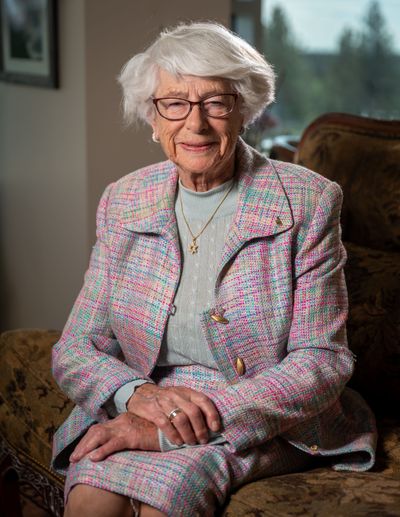School name finalist: Carla Peperzak helped save people from Holocaust and teaches about evils of Nazi regime

Editor’s note: The Spokane school board is expected to pick the names of three new middle schools on Wednesday. This story is part of a series examining the finalists for those names.
If they think about it, students entering a Spokane middle school may have a hard time connecting their young lives with the name of the person above the main entrance.
Most schools are named for people who became famous long ago, for things they did as adults. While Sacajawea made her mark at 16 with Lewis and Clark, it may be hard for today’s middle schoolers to imagine themselves walking across an untamed wilderness in a few years.
But they might be able to imagine themselves in the shoes of a young Carla Olman Peperzak, who some 80 years ago joined the Dutch Resistance as a teenager and helped save other Jews from the Holocaust.
Peperzak is one of nine finalists under consideration to have one of three new Spokane Public Schools middle schools named after her. The 97½-year-old grandmother said it would be “a very big honor” if her name is one of three selected for a new school.
But more than the personal honor, she said, would be the recognition the school district is keeping alive the memory of the Holocaust, when Nazi Germany tried to eliminate some people because of their religion or race, and other people were willing to stop them.
“I find that terribly important,” Peperzak said recently.
State Sen. Andy Billig, a friend of Peperzak who suggested her name to the school district’s screening committee, said it would honor her for her heroism during the war and for having the courage to speak about it afterward.
It was also to “make sure we never forget the Holocaust and to make sure that terrible history never repeats itself,” Billig said.
Peperzak was 16 and had just graduated high school in Amsterdam when the Nazis occupied the Netherlands. Her family was Jewish, but her mother had been orphaned when her Catholic parents died and was later raised by a Jewish family, so her father was able to get papers for her mother, sister and her that didn’t identify them as Jewish.
She joined the Dutch resistance at 18, although she didn’t tell her family. She was young, single and had no children.
“I’m sure I would not have done it otherwise,” she said. “You took a tremendous risk. You have to consider other people.”
She forged identity papers, worked as a messenger, published an underground newspaper of Allied military activities on a banned mimeograph machine and hid other Jews. After studying as a medical technician, she got a job in a hospital where she stole an identity card and bought a German nurse’s uniform.
One day she dressed as a nurse, went to the Amsterdam train station and carried a young relative off a train bound for a detention center, bluffing her way past the German guards by telling them the boy had to go to the hospital.
“My life history during the war was very, very tough,” she said.
Her immediate family survived, but other relatives and friends didn’t.
After the war she married, had children and the family came to the United States in 1958. She didn’t talk about her war experiences for more than 50 years, when the daughter of a friend was in a school play that was performing a version of “The Diary of Anne Frank.” The friend asked Peperzak to talk to the cast because her family grew up near the Franks and she knew Anne’s older sister Margot.
“I had a sleepless night afterward,” she recalled. “It was very, very painful to bring up the memories.”
After her husband died, Peperzak moved to Spokane in 2004 to live near their oldest daughter and her family. At Temple Beth Shalom, she met Eva Lassman, another Holocaust survivor who gave talks on her experiences and was active in fighting bigotry, racism and violence.
When Lassman was no longer able to continue her work, Peperzak picked up the baton: “I realized it was so terribly important that people knew about this.”
Her talks have become easier – she no longer has sleepless nights afterward – and she’s spoken to classes and other groups around the Inland Northwest. Before COVID-19, she said she probably did at least one school presentation a week between January and May each year. She was named Washingtonian of the Year in 2020.
The number of requests declined over the last year, but last month Peperzak spoke at the sentencing hearing for a neo-Nazi who pleaded guilty to spray painting a swastika on a Holocaust memorial at Temple Beth Shalom.
“What can I do to convince this man that the Holocaust happened?” she asked. “How can I get across to him that each human being should be respected?”
Peperzak ends each talk with students with one word: respect. If you can respect one another, you can’t kill, she said.
Middle school students seem to be particularly interested in the message because they’ve had a bit of history, she added.
“They’re old enough to realize what happened, and they’re really open to this message.”